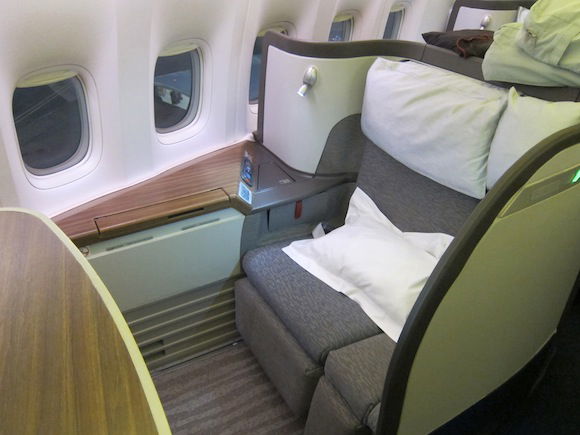I am by no means a tax expert, though fortunately I have friends who are. Last year my friend Scott (@ScottTaxLaw) was kind enough to write a series of posts on business travel and the tax implications, and given that we’re in the thick of tax season I thought it might be helpful to repost some of the highlights.
The series is in eight parts, and while I found all the information incredibly helpful for determining what potential business travel expenses might be tax deductible, I’ve also put together a brief overview for those that might be looking for specific advice:
Making Travel Less Taxing: Introduction
This initial post covers business travel expenses generally, and details when a business travel expense is tax deductible.
A taxpayer may deduct any unreimbursed expense that is ordinary and necessary in carrying on a trade or business activity….unreimbursed travel expenses that are ordinary and necessary to your business will not only earn you miles and points for those charged expenses but also may reduce your tax liability.
Your Tax Home (Away from Home)
One of the key requirements for travel expenses to be considered tax deductible items is that the expenses must be incurred while traveling away from home.
This sounds pretty obvious to me (again, not a tax expert), but apparently there’s more to it than that. This post goes through all the factors the IRS considers in determining your “tax home,” which then determines what of your travel expenses are potentially tax deductible.
The best post of the series for any miles and points enthusiast! The key takeaway for me? Frequent flyer miles are not taxable when earned, and consequently, mileage redemptions do not generate tax deductions.
Thus, all other things equal, the optimal plan for tax purposes is to redeem miles for personal trips and pay cash for business trips since no deduction is allowed for mileage redemptions (whether business or personal) while cash paid for business travel is deductible.

I value my American AAdvantage miles at 1.8 cents each, partly because they can be redeemed for travel in Cathay Pacific First Class. The IRS feels differently.
This post gets into the nitty-gritty of which lodging and meal expenses are tax deductible items. Lodging is based on whether you are an employee or business owner, and is based on your tax home.
For meals incurred while away from home on business, you can use the actual cost of the meals or the standard meal allowance set by the General Services Administration for domestic cities and the State Department for foreign travel.
Entertainment expenses are deductible if they are either directly related to or associated with the active conduct of a trade or business. Words have meaning, especially when used in tax law; and Scott goes through how the IRS defines the terms, and the influence that has when determining what entertainment expenses might be tax deductible items.
In general, all taxpayers who itemize deductions, even employees with no unreimbursed business expenses, can reduce their tax liability for taxes paid to register or purchase personal vehicles. There are more specifics for the self-employed and small business owners, so if your business travel is done via car you’ll want to read up on those.
The Nitty Gritty: Required Receipts and Tax Forms
Officially, you should keep proof (in either paper or digital form) of the date, amount and business purpose of every expense you claim on a tax return. There are exceptions to this, and the reporting requirements for potentially tax deductible business expenses vary based on whether you are an employee or a business owner.
This post covers some of the top questions about business travel tax deductions from the last round, and there is a great discussion in the comments as well.
If you have further questions please ask in the comments, and between Scott and the other tax experts who read the blog we’ll try and get them answered for you! You can also follow Scott on Twitter @ScottTaxLaw or learn more about his legal and CPA practice.
Disclaimer from Scott: While I hope the information I provide will be helpful (and hopefully even humorous at times), none of this information should be construed as offering legal advice or creating an attorney-client relationship between the reader and my law firm. You should not act or refrain from acting based on this advice and should consult your own attorney or CPA regarding your specific tax matters. IRS Circular 230 Notice: Nothing in these communication is intended to be used and cannot be used by a taxpayer for the purpose of avoiding penalties that may be imposed by law.
Disclaimer from Lucky: Scott is a friend, and while I may know a fair amount about miles, points, and cappuccinos, I am not a tax expert. Neither of us have compensated the other for providing or hosting this series – I just thought it would be helpful.





I understand that used award miles can not generate tax reductions...
But, can I write off the purchase of miles for travel? Say I have a 27 hour flight, and I need to work on the plane and have a medical condition that makes coach unbearable without heavy pain medication... If upgrading my ticket costs $500 and 30,000 miles and I spend $600 to purchase those miles from the airline; can I deduct the $500...
I understand that used award miles can not generate tax reductions...
But, can I write off the purchase of miles for travel? Say I have a 27 hour flight, and I need to work on the plane and have a medical condition that makes coach unbearable without heavy pain medication... If upgrading my ticket costs $500 and 30,000 miles and I spend $600 to purchase those miles from the airline; can I deduct the $500 for the upgrade cash portion and the $600 i had to spend to get the miles to fulfill the milage portion of the upgrade?
Scott, if my employer reimburses only up to a certain amount of the IRS per diem limits - eg, $10 for lunch or $15 for dinner even in cities with a much higher IRS limit - can I deduct the remaining amount up to the standard per diem or up to the actual amount? If so, in this case would i be required to follow one of these two or can i still choose? Thanks!
I would argue any taxes or fuel surcharges on a frequent flyer ticket used for business IS DEDUCTIBLE.........but others can do as they so choose..........
@ VeryGoodPoints, the IRS's current position can be found in Announcement 2002-18:
"Consistent with prior practice, the IRS will not assert that any taxpayer has understated his federal tax liability by reason of the receipt or personal use of frequent flyer miles or other in-kind promotional benefits attributable to the taxpayer’s business or official travel. Any future guidance on the taxability of
these benefits will be applied prospectively. "
Damn I wish we had as many tax deductions available over here!
How did the employer know how many miles you earned in order to issue a W-2 or 1099? Some people don't participate in any loyalty programs; conversely others have varying status levels that confer bonus points.
Thanks, Parag. Yes, my foray onto One Mile at a Time was but a prelude to my Southwest flying experience!
VeryGoodPoints, I have not seen or heard of employers reporting taxable compensation on either a W-2 or a Form 1099 to their employees for miles earned on business travel; have you? That would certainly make for some unhappy employees, I'd imagine.
There may be some tax implications if you earn frequent flyer miles on travel paid for by your employer. I've recently encountered this and have been talking with a few tax professionals. If miles are earned and travel is paid for by employer, there's some questions about whether they are a benefit or bonus of employment and potentially taxable. Worth investigating if that's how people are earning miles.
Unrelated but Scott's claim to fame was being on-board the SW flight that mistakenly landed in Branson. http://abcnews.go.com/US/southwest-jet-makes-crazy-landing-wrong-airport/story?id=21510629